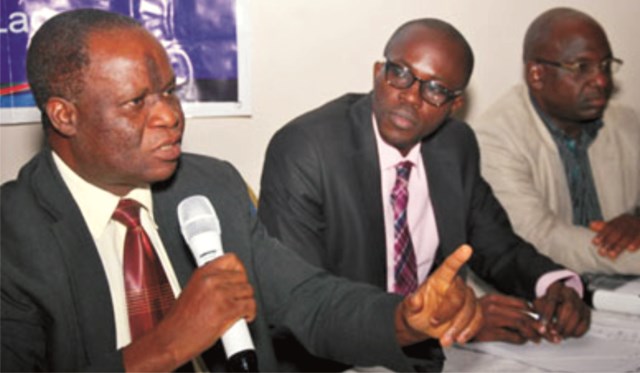Business
TROMPCON Tasks FG On PIB …Makes Case For Host Communities

The Chairman, Traditional Rulers from Oil Mineral Producing Communities of Nigeria (TROMPCOM), Rivers State Chapter, King Dr. Samuel N. Amaechi (JP), has called on relevant authorities of the Federal Government to expedite actions towards the passage of the host community component of the Petroleum Industry Bill (PIB).
Amaechi who is the Onye ishi Agwuru Igbo Kingdom in Etche Local Government Area, Rivers State, expressed disappointment that in spite of the huge contributions of oil producing communities to the socio-economic development of the nation and attendant negative effects of oil exploration activities, that essential component of the bill remains inconclusive.
The royal father stated this while accessing the progress so far within 58 years of Nigeria as an independent nation.
Amaechi said, that we have remarried a united Nation 58 years in spite of mounting challenges, gaves reason for celebration but stressed the need for equity and fairness to be properly entrenched in our system.
“It is disappointing that while crude remains the economic live wire of the nation, communities where the crude comes from are not fairly treated. This contradicts civilised standard”, he said.
The association’s Chairman lamented that while these communities produced over 85 percent of the nation’s revenue and for over six decades, laws that should protect these producing communities were yet to be properly entrenched in the nation’s constitution, gaves serious reasons for concern.
He further noted that while gas flare had become history in oil-producing nations of the world, oil producing communities in Nigeria continued to suffer over it.
“The irony is that the fines paid by oil multinationals for flaring go to the Federal Government in Abuja instead of the oil-producing communities who directly suffer, sick and die as a result of the negative effects of flaring.
“Oil spill has destroyed the environment of oil-producing communities whose occupation is fishing and farming.
“What could have been the real economic situation of the nation without crude? Equity and fairness demand that these communities be appreciated and also given their due share as to give them a sense of belonging”, he said.
Chris Oluoh
Business
Agency Gives Insight Into Its Inspection, Monitoring Operations

Business
BVN Enrolments Rise 6% To 67.8m In 2025 — NIBSS

The Nigeria Inter-Bank Settlement System (NIBSS) has said that Bank Verification Number (BVN) enrolments rose by 6.8 per cent year-on-year to 67.8 million as at December 2025, up from 63.5 million recorded in the corresponding period of 2024.
In a statement published on its website, NIBSS attributed the growth to stronger policy enforcement by the Central Bank of Nigeria (CBN) and the expansion of diaspora enrolment initiatives.
NIBSS noted that the expansion reinforces the BVN system’s central role in Nigeria’s financial inclusion drive and digital identity framework.
Another major driver, the statement said, was the rollout of the Non-Resident Bank Verification Number (NRBVN) initiative, which allows Nigerians in the diaspora to obtain a BVN remotely without physical presence in the country.
A five-year analysis by NIBSS showed consistent growth in BVN enrolments, rising from 51.9 million in 2021 to 56.0 million in 2022, 60.1 million in 2023, 63.5 million in 2024 and 67.8 million by December 2025. The steady increase reflects stronger compliance with biometric identity requirements and improved coverage of the national banking identity system.
However, NIBSS noted that BVN enrolments still lag the total number of active bank accounts, which exceeded 320 million as of March 2025.
The gap, it explained, is largely due to multiple bank accounts linked to single BVNs, as well as customers yet to complete enrolment, despite the progress recorded.
Business
AFAN Unveils Plans To Boost Food Production In 2026
-

 News3 days ago
News3 days agoOji Clears Air On Appointment Of 15 Special Advisers By Fubara
-

 News3 days ago
News3 days agoNigeria Has Woken Up From Slumber Under Tinubu – Shettima
-

 Featured3 days ago
Featured3 days agoRivers: Impeachment Moves Against Fubara, Deputy Hits Rock …As CJ Declines Setting Up Panel
-
City Crime3 days ago
Health Commissioner Extols Fubara’s Commitment To Community Healthcare Delivery
-
News3 days ago
Nigeria To Begin Exporting Urea In 2028 -NMDPRA
-
Niger Delta3 days ago
Tinubu, Leading Nigeria To Sustainable Future – Okowa … Lauds Oborevwori Over Uromi Junction Flyover Construction
-
News3 days ago
US – Nigeria Security Engagement Translating Into Tangible Operational Gains – NSA
-

 News3 days ago
News3 days agoKing Jaja Impacted Beyond Rivers -Deputy Gov

